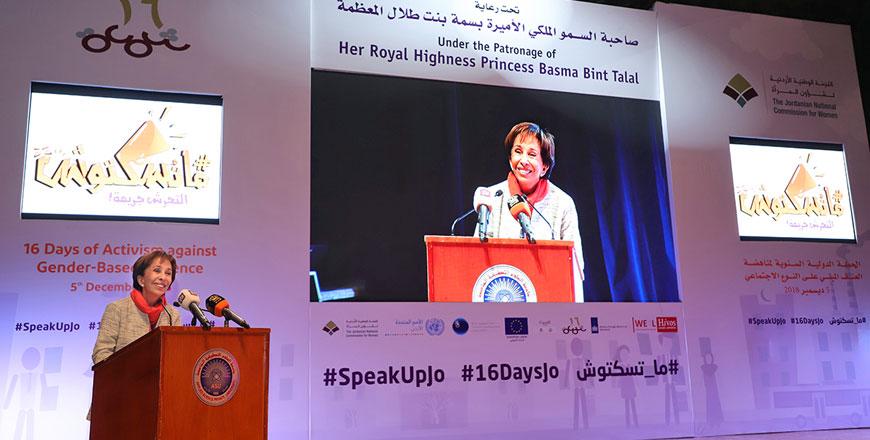You are here
Debate on sexual harassment heats up following 16-day campaign as MP, commentators cite ‘bigger problems’
By Maram Kayed - Dec 09,2018 - Last updated at Dec 09,2018
AMMAN — Debate on the issue of sexual harassment in Jordan has intensified in recent days, since the spark of the 16-day campaign against gender-based violence, as people stood at extreme ends of the spectrum, between those who deny the issue altogether and those who insist it is a pressing one.
The 16 Days of Activism Against Gender-Based Violence Campaign pushed some people to deny sexual harassment even exists in Jordan, in response to the wide support the campaign drew from Jordanian activists.
Hashtags such as “#SpeakUpJo”, “#Don’t_stay_silent” and “#Harassment_is_a_crime” have been launched recently with the rising talk about harassment in Jordan.
In the wake of the campaign, launched by the Jordanian National Commission for Women (JNCW) and various UN agencies, studies were presented at the event, showing facts on sexual harassment.
The JNCW put forward a study stating that 89.1 per cent of the demographic samples have been exposed to gesture-like harassment, and 68.7 per cent endured physical harassment.
The Sisterhood Is Global Institute presented yet another study, showing that rape incidents occurred every two days on average in 2017.
The awareness campaign, with its “Speak Up” slogan, hopes to assure vulnerable victims of gender-based violence that speaking up about the issue will help them, the JNCW explained.
Some 30 per cent of harassment victims are oblivious to the fact that the act is punishable by law, the JNCW study said.
Although having received nationwide support, the campaign came under fire as MP Mosleh Tarawneh said in a Facebook post that “sexual harassment is not a problem in Jordan”.
Instead, he said, corruption is “the bigger problem”.
Comments from citizens who agreed with Tarawneh’s statement questioned the campaign’s funding.
They insisted that it insulted society’s “good values” and demanded that similar campaigns be launched against corruption too.
“It is obvious that the campaign seeks to score funding from Western donors. Harassment is not a real issue; we do not have this problem here; why are they selling it as a major one?” Khaled Zaal responded to Tarawneh’s post.
Ayesh Nawayseh, another commentator, described the campaign as “a way to secure grants from international organisations”.
Sceptical of the campaign, people urged the MP to look into its funding and — as put by Ahmed Basel — into “studies conducted by a neutral side that don’t benefit from shocking statistics”.
Related Articles
AMMAN — HRH Princess Basma on Wednesday said that it was everyone’s moral responsibility to help eradicate sexual harassment from society.&n
AMMAN — Confronting the phenomenon of sexual harassment in Jordan is a matter of high priority which needs to be addressed on a national lev
AMMAN — More than 20 organisations have begun work on a plan to limit acts of sexual harassment in areas across the Kingdom during the 16-Da
















